The ominous official house calls to tenants of Cape Town’s De Waal Drive flats have been happening since May 18.
The flats have a prominent place in Cape Town’s most iconic skyline – the one of the cityscape with Table Mountain as the backdrop. At the foot of Devil’s Peak they rise, old and fortress-like, to shield the chic neighbourhood of Vredehoek from the still undeveloped District Six below.
Most of the tenants of the 90 households look back on lives of hardship unknowable to their wealthy mountainside neighbours. Yet they have maintained – or gained – a position of unrivalled opportunity for low-income families in modern-day Cape Town.
The flats, owned by the Western Cape’s human settlements department, have remained affordable thanks to a rental scheme that charges households based on their income. This, in the face of rocketing property prices and ongoing evictions of poor families by private landlords in other neighbourhoods – such as Zonnebloem, Woodstock and Salt River – close to the city centre.
From De Waal Drive, poor families have access to good schools for their children and job opportunities for those children when they graduate. There is safety, hospitals and many amenities so desperately lacking in the Cape’s crowded townships and informal settlements. Their support networks – churches, mosques and social groups – are nearby.
In a recent policy turn in the national urban agenda, all spheres of government have concurred that more of this – dense, mixed-income residential areas close to nodes of opportunity – is the key to transforming city spatial patterns inherited from apartheid.
Panoramic view
Added to the practical advantages, the flats’ tenants have an uninterrupted panoramic view of the harbour, the skyscrapers of the city centre and sunsets over Signal Hill. To be sure, today this prime property is in one of the most lucrative real estate markets on the continent: property fit for the country’s economic elite. And that is exactly how officials from the department now frame it as they go door to door to inform tenants that their relocation to a housing development on the urban periphery is imminent.
Last week tenant Carol White (57) had the dreaded knock on her door.
She called me to sit in and listen to the department’s presentation, as she wanted moral support and believed I could advise her on how the presentation would affect her life.
“It is decided that it is no longer viable for us to receive the rent we’re currently charging,” an official (who asked not to be named) explained in his best officialese. All the flats will be refurbished and tenants who can afford “market-related rentals” under a new lease agreement are welcome to stay. If not, they have the option of relocating to (and owning property in) Pelican Park – a housing development in a poor area some 20km southeast of the city.
“So the judge can’t say we didn’t offer you an alternative,” the official added, an apparent reference to the big question facing a magistrate during eviction proceedings – whether there is alternative accommodation.
To White’s protests that a move to Pelican Park would spell disaster for her grandson entering matric next year, the response was: “Ma’am, we all have our problems. But we wouldn’t get our job done if we were to consider everyone’s problems. Have you seen the views from around here? We all want to live close to the city. But you can’t pay so little when people pay millions to be able to live around here. Just look at the views.”
Isolation tactics
Louis Verblun, a tenant and the elected chairperson for the building’s residents’ committee, believes this tactic intentionally isolates tenants from the group and then intimidates them. For weeks he has requested a written explanation from the department, and has lobbied against the house calls.
“There are many pensioners here and vulnerable people,” he said.
“Can you imagine how intimidating it must be to have officials arriving at your door after all the rumours that have been circulating? All alone like that, you stand no chance. For now, as we try to find out more, we’ve simply said: ‘Do not sign anything.'”
In the panic that accompanied the rumour mill, the committee has solicited donations to cover a lawyer’s services. Tenants who can’t afford the R200 contribution can help out by doing their bit in the kitchen for a cake sale, committee treasurer Margarita Loubser (51) announced at a recent meeting.
No, she said, the free services of Legal Aid are not an option: “It’s our homes we are talking about; this is serious stuff.”
Yet the foreboding message delivered to Carol White seems at odds with a response issued some weeks ago by Zalisile Mbali, spokesperson for human settlements MEC Bonginkosi Madikizela. He said that lease agreements would only be terminated should tenants default on future payments. Requests for clarity and comment, however, have been unsuccessful.
Rent hikes
Even more than the proposed rent hikes, it’s these divergent messages and lack of consultation with the tenants that lie at the heart of the confusion and panic. Indeed, the fact that any decision about the future of the flats was made and imposed without a substantial participation process involving the current tenants is legally problematic, said Sheldon Magardie, a housing lawyer and director of the Legal Resources Centre in Cape Town.
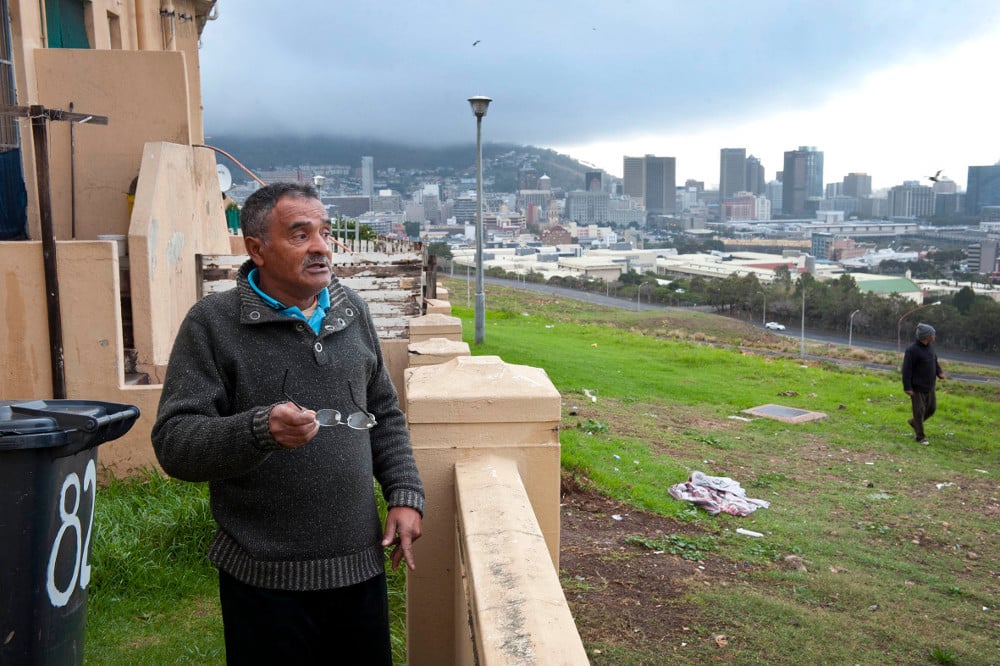
Tenant Fuad Isaacs (54, above) lays as much claim to the panorama as the people who paid millions to be there. One can imagine that few can bask in the pinks and purples of sunset over Table Bay more than he does.
His attention shifts from the skies, horizon and distant history to the rocky foreground below his back door. Here is where he finds true solace and meaning in the view.
As he speaks, he points here and there to the now nonexistent street corners, girlfriends’ homes and rugby fields of his youth in District Six. He sends his 11-year-old son to fetch a crumpled photograph of the ghosts of Windsor Street to show you the places of which he speaks. As with many stories of District Six, it is an account that could go on uninterrupted for hours.
“Finally, this home is my reward,” he said, referring to the De Waal Drive flat “given” to him on a rental basis after years on the government’s housing waiting list.
Obstinate refusal
A reward, indeed, for his obstinate refusal to yield to the apartheid state and its attempts to cast him far beyond the city limits. Isaacs’s family was one of the last to be removed from District Six. On the day that their furniture was hauled to Mitchells Plain, he bluntly refused to help his parents pack. He watched as the truck and family left without him. So began years of squatting from friend to friend’s house – keeping below the radar of the state.
“I am from this city. We are the indigenes, much more so than people who came later. No matter if they have money or not. I care nothing for the Cape Flats. My parents were okay, because they were older and found all their friends in Mitchells Plain, yes. But I was a young man. There was nothing for me out there. My everything was here,” he says.
The trauma of those evictions and the defiance he felt towards them re-emerges as he speaks of the new government’s plans to do the same to his family that was done to his parents. This is the rightful place for him and his children, he says.
At the time of those removals, the De Waal Drive flats were spared – ostensibly to house poorer white households already living there or displaced by the demolitions. Now in their mid-70s, Judith and Ralph Pace are one such white couple evicted from the multiracial neighbourhood below the drive. They have lived here since 1970. Most of those original tenants, formerly employed in low-income jobs protected under apartheid, are state pensioners now. The Paces’s monthly income, R2?800 for two state pension grants, will be enough to cover only about half of the rent expected by the department for their home in the near future.
As older tenants died or the flats became otherwise vacant, families on the government’s housing waiting list benefited from income-related rental agreements with the Western Cape government. Many, like Isaacs, have histories in District Six. Also in the fray are evictees from other state properties like Anneline Mohanlall, who was evicted from Sea Point 11 years ago. Others are housing list beneficiaries from further afield, like Peter Dias, who moved to the drive from Strandfontein (which, incidentally, is adjacent to Pelican Park).
Escape
Dias’s flat is sparsely furnished and very tidy. It’s the middle of a weekday; he’s home alone. He’s been here with his family for 11 months. For him, moving from Strandfontein was an escape from a gang-ridden area where violence was commonplace.
“It was dangerous and cost so much to travel anywhere to look for a job,” he says. “I am unemployed. But my son has a job and he can walk to work from here. My daughter is pregnant and the hospital is right around the corner. I waited 30-odd years for this – my entire adult life. And what now? It’s not even been a year [and] the department wants to move us right back to where we came from.”
For housing justice activists, questions remain. What, outside of the rumour mill and divergent explanations, are the real plans for De Waal Drive and its tenants? Why, if not motivated exclusively by a business model and the value of the land, has it been decided to hike rents to permanently exclude low-income families from the precinct in the future? And can such proposals be reconciled with the state’s long-term vision for class integration in Cape Town and South Africa’s cities as a whole?
Tales of lives uprooted: ‘I’ll only leave in a coffin’
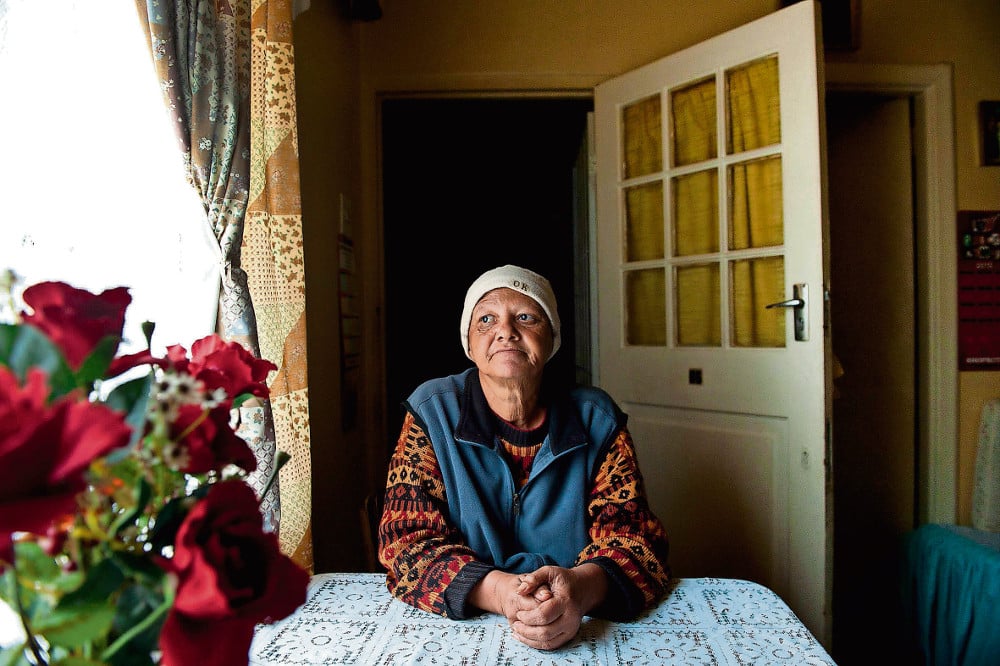
Sophia Swartbooi (65) – tenant for 19 years
“My husband passed away last year – I have all of our furniture, everything that reminds me of him, in that flat. They say that the flats in Pelican Park are too small and that I would have to get rid of my stuff.
“The day I heard this news, I was so shocked and afraid. My doctor asked me: ‘Sophia, why is your blood sugar so high? What is it that is bothering you?’ And so I told them that they want to put us out of our homes.
“The doctors kept me in hospital for the whole day, because I was close to having a stroke, they said. My doctors have known me for years. How will I be able to afford to travel to see them? I only get a little money from my state pension, but I try to do the right thing and pay my rent every month. How will I cope on my own?”
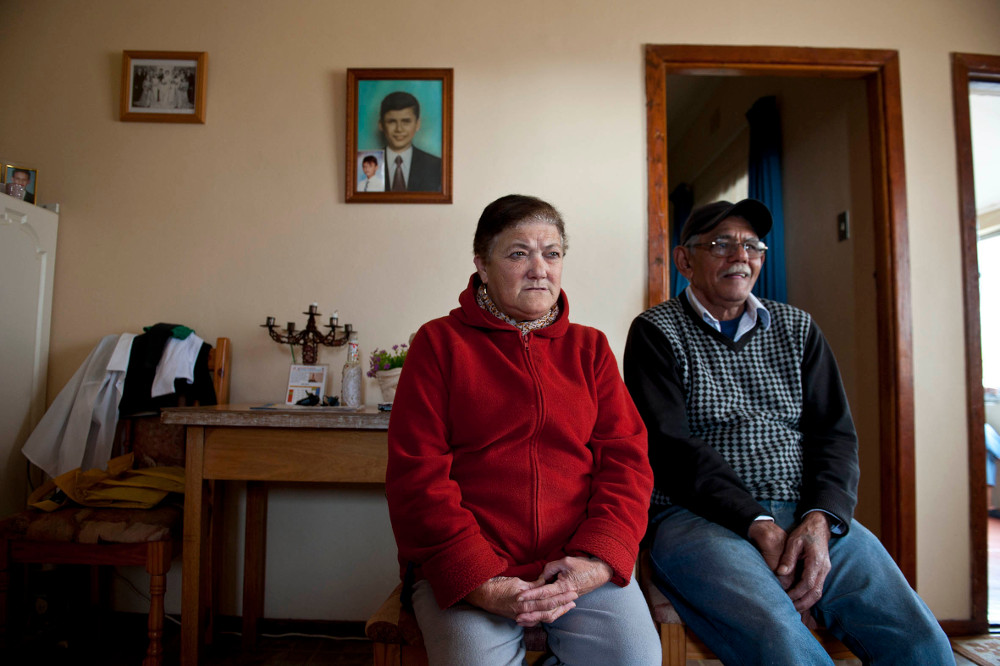
Frederick and Gail Bernickow (65 and 66) – 10 years
“We were born here, in District Six. Our families saw everything that happened here, when people were removed under apartheid … They found a place in Walmer Estate so as not to be removed as well. But still, we had to stay with our parents because there was no other place for us. We spent 20 years on a waiting list for this home. Look around – all these renovations done with [our] bare hands.
“Now our grandchild lives with us and has the opportunity to … grow up in the same place where his family is from. It is easy for us, because he can walk to school and it is safe.
“No, no one can take this from us. In a coffin – that is how I will leave one day when the time comes.”
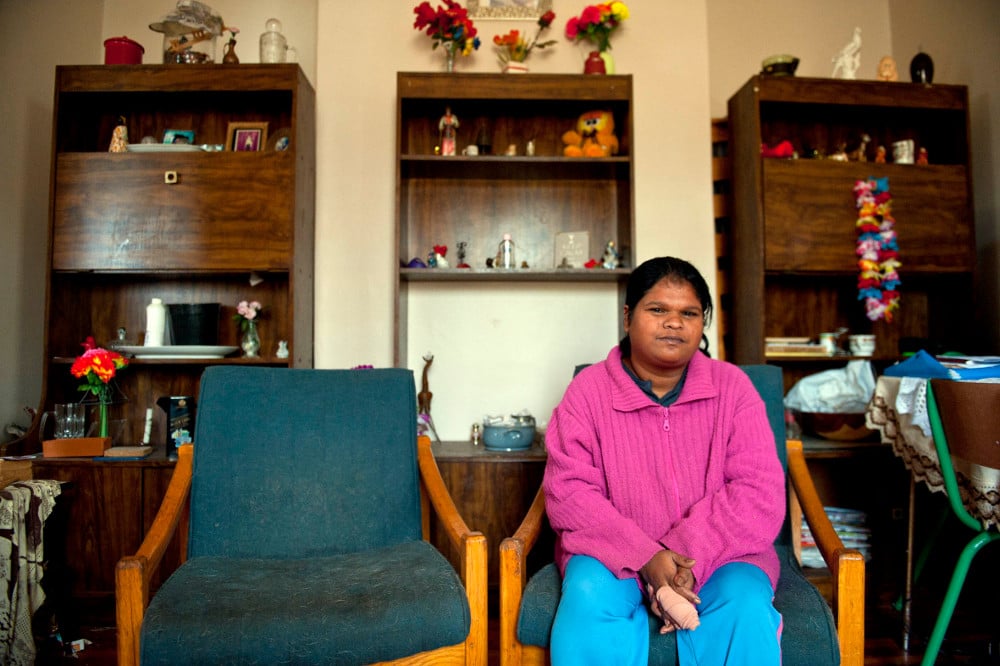
Anneline Mohanlall (31) – four years
“This is sad for me because it is the third time that they want me to move to a new place. We did not want to come here in the first place. Mom and I did not want to leave our home in Sea Point. She was very sick with cancer and moving from Sea Point was difficult. But we had no choice – the government gave us no choice.
“My mother used to talk for me, but when she died I had to talk for myself. I walked down the hill to the housing department every day.
“I was pregnant and, with all that stress, I lost my child. I feel like I have had my baby’s and my mother’s memory taken away because of having to move to this flat. Just when I felt I have found peace, I am told we have to move again – this time to somewhere very far away.
“I am alone without my mom, but at least I have friends here and still have my church in Sea Point to care for me. My disability grant only pays a little bit, so the food parcels that the church people give to me are very important. How will I be able to travel from Pelican Park all the way to Sea Point, to my church?”
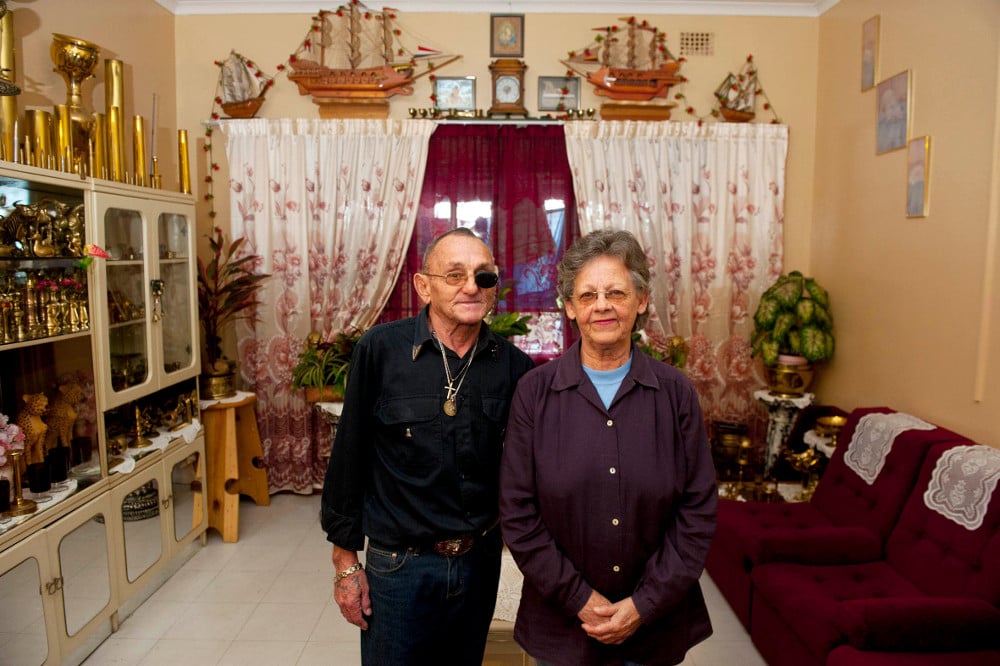
Judith and Ralph Pace (73 and 74) – 45 years
“Neither of us was born with silver spoons; we worked hard for over 40 years to build up this home as a good place to raise children. And now, long after we retired, the government comes one day to say that we are on prime property and that our own home is too good for us?
“It’s cruel because we have no more information than that. Just this story that our time is up, told to us by our neighbours. So when we go to bed we lie next to each other and think: ‘How long do we have? A few more weeks? Days?’
“It’s been a tradition in our family for us to receive little brass ornaments from our kids and friends at Christmas time. We’ve grown older, so by now we have hundreds of these little gifts. It’s a collection that brings us happiness in old age; it tells us about our whole life together and reminds us of all our loved ones.
“We’ve heard the new place being offered does not have any space, so we’re afraid we would have to part with these memories. We’ll be married for 50 years in June and now we’re not even sure if we’ll be in our home for that happy day … or another Christmas.”
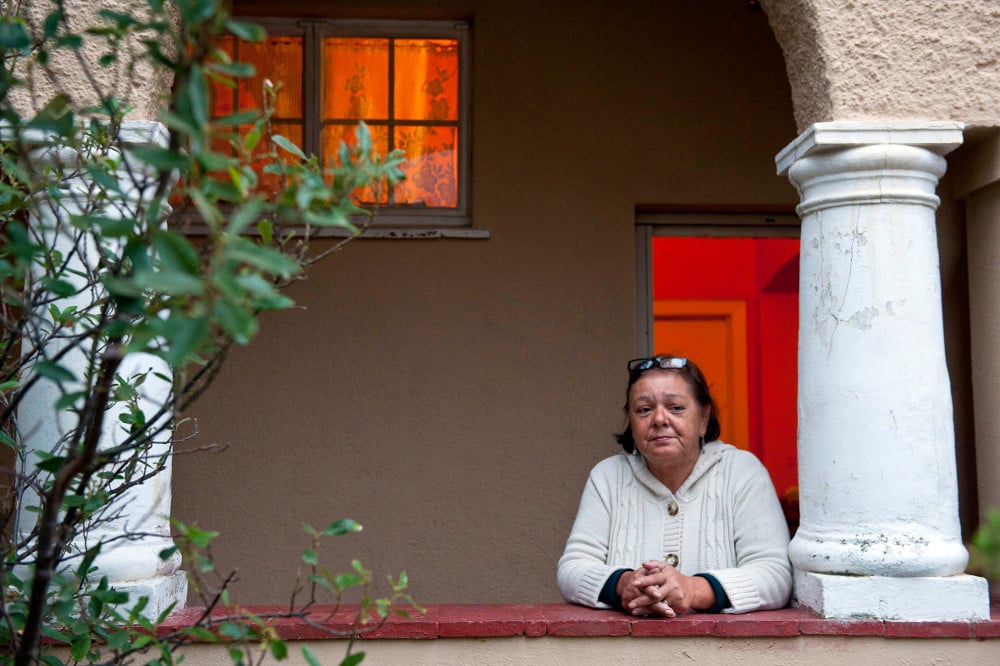
Carol White (57) – 17 years
“We know what this is: this is gentrification. Our own government, the one that is actually supposed to look out for the people, is now acting like a property developer. They want to put yuppies in our homes.
“It has happened to many original families in Zonnebloem and Woodstock, so how can we say that we are totally surprised? But what they do not realise is that they are taking an ‘example’ community out of this city. You walk this street at night and you are safe, because we look out for one another.
“When a granny gets sick on the drive we all, almost every one of us, will make a little food parcel and visit her until she is better.
“My grandchild is 17 years old and next year he will be in matric. How could we have chosen a better environment for him? Look, even now he is in his room studying. He has never touched a cigarette or alcohol. Now imagine all that he and the family have worked for towards his future being threatened if he was uprooted on the brink of his matric year.”
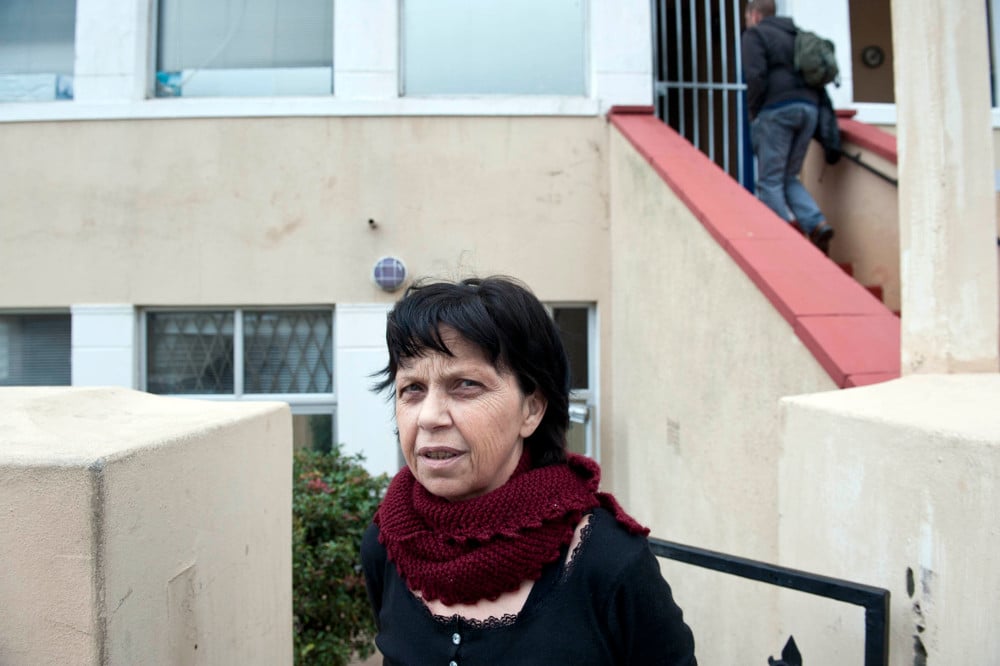
Joanne Johnson (53) – 36 years
“Don’t look at our views. Look at the fact that we can also be seen from all around. This community can really stand out as an example for the rest of Cape Town.
“It can be a good story for government to tell. People that were once separated by apartheid have come back together and have built a strong community.
“Over and above the property value, that is what’s really important about De Waal Drive.”
Daneel Knoetze is the urban land justice researcher at Ndifuna Ukwazi and a freelance journalist.